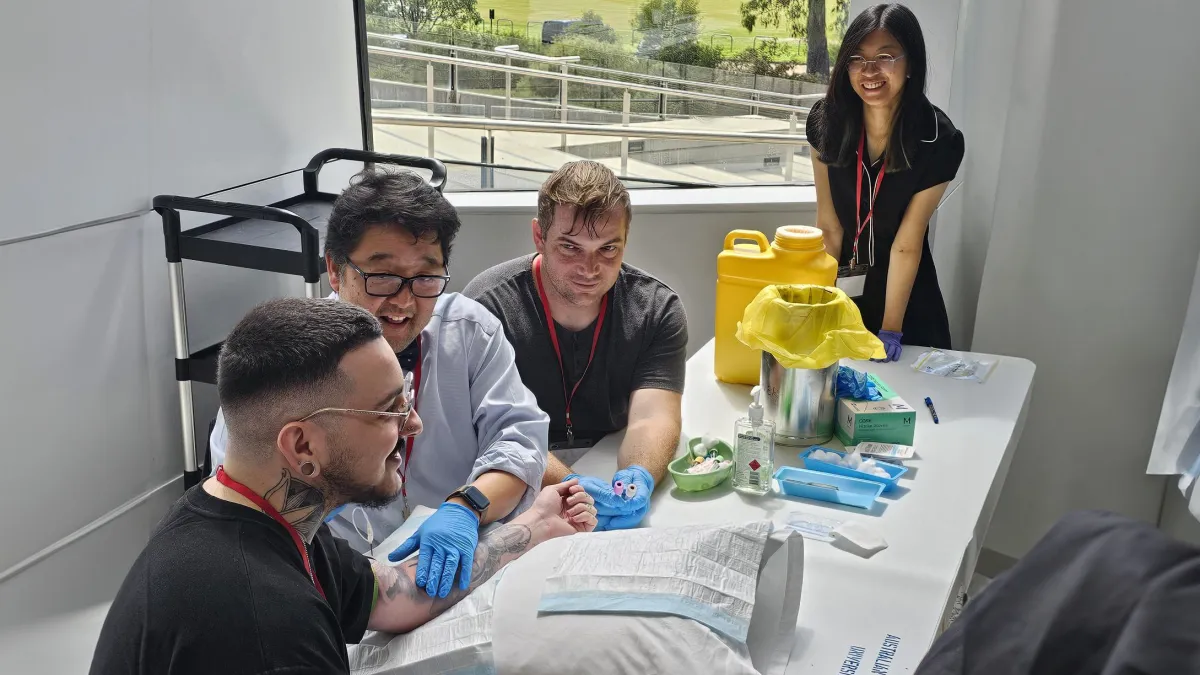Serving up JCSMR research on a plate(let)

By Dr Sidra Ali, Dr Philip Choi and Professor Elizabeth Gardiner
Scientists in the Gardiner Group of the John Curtin School of Medical Research (JCSMR) have successfully performed platelet function assessment of all the patient attendees of the ITP Patient Conference 2024.
The ITP Patient Conference 2024 was held on 9 March at the Finkel Theatre in JCSMR. This event brought together patients living with immune thrombocytopenia (ITP) together with their carers, ITP clinicians and JCSMR researchers. ITP is an autoimmune disorder, characterised by immune system dysregulation that leads to the premature destruction and removal of platelets from circulation. This can cause a transient or long-term decrease in platelet numbers, placing patients at high risk of bleeding. ITP is the most prevalent autoimmune disorder of blood cells, with 3.3 new cases per 100,000 adults every year and 9.5 per 100,000 adults living with this disorder worldwide. This equates to roughly 2000 -2500 new ITP cases in Australia every year.
The Conference was organised by ITP Australia, a patient-led organisation that strives to raise awareness of ITP and maintain a support network for ITP patients. There were over sixty participants, including twenty-four patients, making it the highest-attended event in the organisation's history. Patients travelled interstate to reach this meeting from regional Australia including Shepparton, Cowra, Berry, and Port Macquarie. ITP experts from across Australia also converged in the nation’s capital including Drs Danny Hsu (NSW), Sarah Ng (NSW), Robert Bird (Qld), Chris Barnes (Vic), and CheeWee Tan (SA).
The Gardiner Group's initiative to collect and process patient blood specimens on-site and then assess patient platelet function, was the highlight of the conference. We managed to perform blood counts, platelet surface receptor evaluation by flow cytometry, and rotational thromboelastometry (ROTEM) - a functional readout of platelet contribution to clot formation. Peripheral blood mononuclear cells, genomic DNA, plasma, and serum from all patients were also stored on the day.
This was a huge undertaking that involved a lot of pre-planning, delegation of tasks, and involvement of the entire research group to ensure smooth operation on the day. These tests provide critical information on platelet function, which is necessary to understand the clinical course of ITP, as platelet count alone is not a good predictor of bleeding in these patients. While ITP is generally diagnosed through the exclusion of other causes of low platelets, these research techniques provide a better understanding of platelet function, which is not routinely assessed in clinical settings.
All these results will be added to our National Platelet Research and Referral Centre (NPRC) data base. NPRC is a collaborative initiative between Australian National University and The Canberra Hospital with the goal to integrate innovative research skills with clinical medicine to improve the management of individuals with ITP.
Attendees received their test results and interpretative advice from Dr Philip Choi before the end of the conference, which served as a tangible souvenir of the day's proceedings. The day was long and hard for every member of the team who was involved in obtaining consent, collecting blood, processing, and reporting results. But when we all entered the Finkel at the end of the day, the audience's applause refuelled our motivation.
There was a palpable excitement amongst the patients upon receiving their personalised results, which underscored the value of bringing the research interface to the patients. We spent time with patients and explained what we were trying to achieve in the research setting. Patients and carers expressed their gratitude to researchers and physicians for their combined efforts to advance ITP understanding and treatment.
Overall, the 2024 ITP Patient Conference was a significant platform for the exchange of lived experiences, empowerment, and building a sense of community among people living with this complex disorder. Real-time reporting of the research data was a trailblazer and has paved the way for future events in the field.



